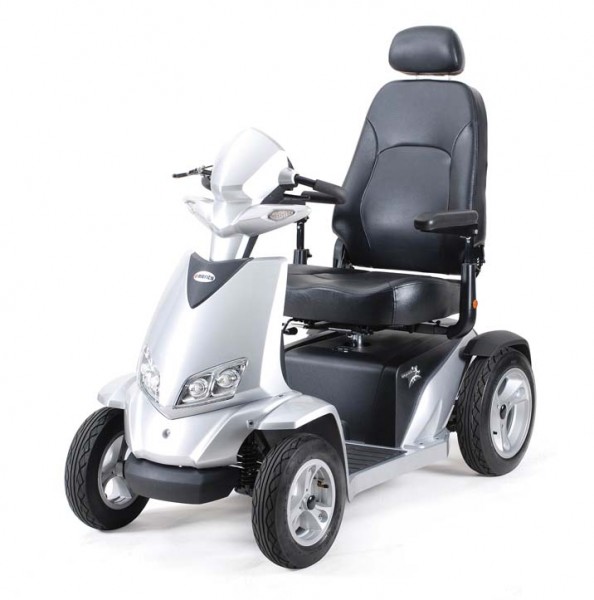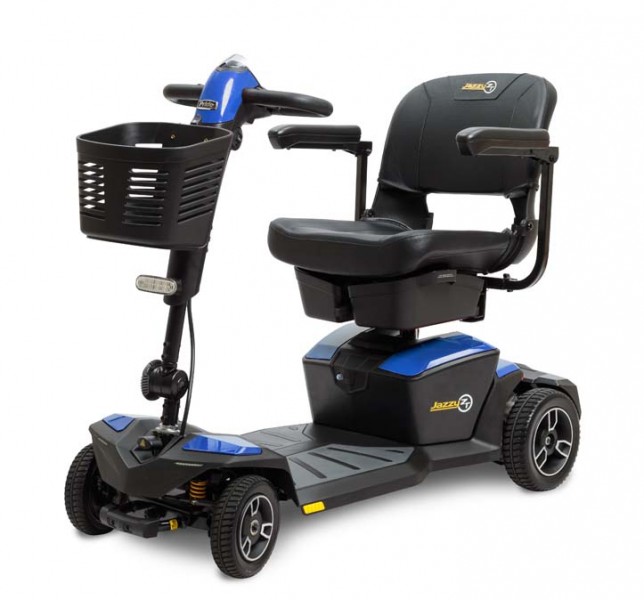To better provide for our readers, we have provided an extended version of the questions and answers that ran in our November 2017 print issue.
MERITS HEALTH PRODUCTS
Michael Hughes National Sales Manager www.meritsusa.com
 Merits Scooter
Merits ScooterWhat is your specialty? HUGHES: Merits Health Products specializes is power mobility products—our core competency is making high quality reliable motors. What strategic shifts in thinking and business management have occurred that have helped grow the business? HUGHES: We have refocused on our core competencies, power mobility, beds and manual wheelchairs. We have begun discontinuing items that were not within our core competencies so our totally focus is on what we do best. How has the market for these products changed over the last 3 years? HUGHES: The market has defiantly shifted to more of a cash market. End users are willing to pay for feature such as lights and suspension. They are not willing to settle for what insurance will pay and are paying cash for higher-end features they want. What forces have put the most pressure on this product category? HUGHES: Reimbursement, You can only lower manufacturing costs so low and still product a quality product. This challenge has put a lot of pressure on this category. It has forced us to look at every option for cost control while still producing quality products. How do you differentiate your products from others in the category? HUGHES: We try and offer a full line of scooters, ones for reimbursement multiple for retail options and we have many veterans that love our pioneer series. How are you responding to the demand for value-based medical products/devices? HUGHES: Merits is a true manufacturer so we are able to work very closely with sourcing and manufacturing to keep costs as low as possible. Why should scooters be attractive to HME providers? HUGHES: There are so many cash opportunities in the scooter category; HME providers should be excited about this category and what it can do for their bottom line. How can HME providers realize profitability with this category? HUGHES: HME providers should have numerous models on their showroom floor so customers can see their options and have the ability to upgrade to features they want. Focusing on the upsell or add-on sale is also a great way to add to the bottom line. What other products could this customer benefit from? A ramp or stair lift? It could be something even small like a cup holder or accessory to hold their other mobility device. Even if these items are not purchased at the time of sales, letting customers know the options and products available … they may come back a week or two. How do you maintain product integrity in the online marketplace? What steps does your company take to protect MAP pricing for dealers? HUGHES: We have a strictly enforced MAP policy. We also partner with great providers who want to represent our products in the correct manner. What trends have you identified for scooters? HUGHES: They are growing more and more with retail and ecommerce. People are willing to pay for high-end features such as speed, suspension, color options and upgraded light packages. How do you approach product development? HUGHES: We take feedback from our end users, providers and referral sources. They all provide a different perspective and help us develop great products. What tools do you provide to help educate dealers and potential product users? HUGHES: We offer hang tags as a quick reference on top selling features. We offer end-to-end product comparison posters so consumers can easily see the differences in certain units. Each unit also has consumer friendly sell sheets.
PRIDE MOBILITY
Micah Swick Director of Sales www.pridemobility.com
 Jazzy ZT
Jazzy ZTWhat is your specialty? SWICK: Innovation. What forces have put the most pressure on this product category? SWICK: Changes in reimbursement and consumer reimbursement/coverage expectations have been the biggest factors. How do you differentiate your products from others in the category? SWICK: Pride has several differentiators, better name brand recognition, dedicated representatives, better quality and reliability, and shorter freight times are a few of the things our retail partners tell us. We also endeavor to be the innovation leader in the space and seem to be doing well with that effort. How are you responding to the demand for value-based medical products/devices? SWICK: We have a strong assortment of value-based devices but we see the demand shifting. Consumers might be willing to accept whatever is available when its free but when we’re paying something our thinking changes; style, quality, and features become much more important. There will always be a low-end market but we’re focused on developing innovative, feature-rich products of want. Why should scooters be attractive to HME providers? SWICK: Because the largest and wealthiest consumer group in world history is entering the stage of life when they need exactly this product and nobody else is better positioned to capitalize on the opportunity than the HME retailer. How can HME providers realize profitability with this category? SWICK: By embracing everything retail and incorporating their own local flavor. What steps does your company take to protect MAP pricing for dealers? SWICK: Pride has a strong strictly enforced MAP policy but everyone need to embrace the online marketplace. This isn’t a brick-n-mortar against the internet situation. If doing business directly with the end user, you must have on e-commerce platform. How do you approach product development? SWICK: We start with the consumer and build up. What tools do you provide to help educate dealers and potential product users? SWICK: We do a number of things but something we are very proud of is the new website we launched late this summer. It has proven to be a great resource for our partners as well as end users.
